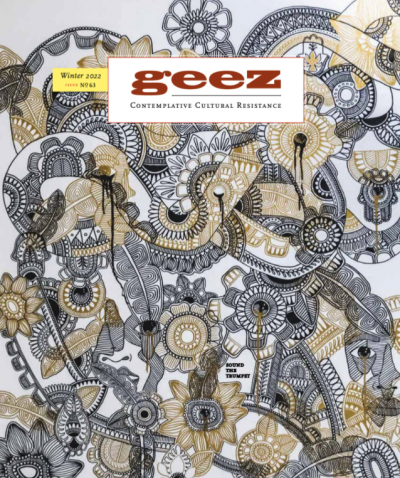Thinking Abolition Theologically: An Interview with Hannah Bowman

Detail of “The Scrivener / The Activist / The Beatnik” by Bard Judith, Fall 2021, digital ink/charcoal, A4, South Korea.
Jubilee is both a liturgical act and also a concrete political reality.
We’d love to hear your background. How did you get involved in prison abolition work?
Hannah Bowman: I’m an adult convert to Christianity. I was baptized when I was in college and soon after I got involved with a Bible study through the college chaplaincy that took us out to a girl’s juvenile detention centre. It became an essential part of my practice and experience of Christianity.
We would go Thursday evenings, and there would be maybe three of us from the college and three girls from the detention centre who would come together for a little Bible study and church service. I think that’s one of those experiences that you can’t back away from. Once you see these are children who are incarcerated, who are some of the best theologians I’ve ever met. And we were just having these profound experiences of community in this tiny little meeting room in this facility in the middle of nowhere.
After the uprising in Ferguson in 2014, I started reading Mariame Kaba’s blog “Prison Culture” and was learning basically everything I could about the prison industrial complex. In early 2015, I was on an Amtrak train late at night reading Maya Schenwar’s book Locked Down, Locked Out, which combines her experiences of her sister being incarcerated with her work as a journalist reporting on issues related to mass incarceration. She makes a really strong case for using restorative and transformative justice alternatives and the idea that we don’t need prisons.
And I had this epiphany that really felt almost like another religious conversion moment. Up until that point, I had been sort of justifying prisons to myself, like, “Oh, we have to have prisons, we have to enforce the law. We have to have this system because how else will we have society?” But this was an experience of profound relief. To finally say, “I don’t think we need to lock people up in prisons. I don’t have to keep trying to justify this violence of incarceration. I can just let it go.” It was so exciting, to just be able to say, “No, I’m against prisons. We don’t need those. Let’s abolish them.”
How did this epiphany lead you to found Christians for Abolition?
HB: I was increasingly interested in theology, and so in 2018, I decided that the place to take my energies was towards organizing Christians for prison abolition on theological grounds. And some of that was already being done. The Quakers, the American Friends Service Committee, have had a long history of working against mass incarceration. There’s also been Christian abolitionist work coming out of Black liberation theology – Nikia Smith Robert is a particularly important recent voice in that. But at the same time, I googled “Christian prison abolition,” and not a whole lot showed up.
Most of my sources on abolition at that time were coming out of the Black power and prison resistance movements. I loved those sources and wanted to bring that to my own communities, which are mostly white, mainly progressive Christians. So I figured I’ll start a website, a place that will have a web presence, and we can start a resource list. So that’s how it started. We’ve also been doing a blog series called the “Abolition Lectionary Series,” working with the lectionary texts and writing about them in abolitionist terms every week. The central question as we grow this organization is, “How can we think abolition, theologically?”
What kinds of theological tools have you used as you create this space for thinking abolition?
HB: My own spirituality is very sacramental. I think a lot about the Eucharist, confession, baptism, and communion. Our sacramental and communal life is what draws us into relationship with incarcerated people, but it is also affected and shaped by our relationship with incarcerated people. I don’t think we can rightly celebrate the Eucharist in our churches without the experience of serving communion to people who are incarcerated. And we can’t rightly understand baptism in our church communities without understanding how this forms us into a community which is opposed to these death-dealing powers of the world.
My theological thinking relies on the idea that all of this is one seamless garment. Our sacramental life shapes our ethical life, and vice versa: our ethical proximity and our work for justice shapes our understanding of our sacramental and communal life. I think that’s in some ways a challenge to how churches often conceive of ourselves. It’s a little bit outside the standard programmatic model where we have worship, and then we have outreach, and those are separate things. Instead, can we think about building a broader community, a revolutionary community of mutuality and solidarity, that includes everybody on the inside and the outside?
Do you find that abolitionism has roots in scripture and in church history?
HB: In The Fall of the Prison, Lee Griffith talks extensively about jubilee as a paradigm for abolition in Christianity. He describes the jubilee laws as a way of making concrete the memory of God’s liberation of a people in bondage. So jubilee is both a liturgical act and also a concrete political reality. Whether this actually ever happened is not quite clear. But the jubilee laws are in this really beautiful space where they’re a commemoration of the exodus, of liberation, of the freedom of the people and the sufficiency of coming into the land, while at the same time they are this political reality saying no, this is a real thing that affects what we do with our debt, our money, our land. And so the original jubilee tradition is picked up by the prophet Isaiah who talks about “declaring freedom to the prisoners.” And from there the tradition is picked up by Jesus.
When Jesus comes and he makes his first sermon in Luke 4, he declares jubilee. In Jesus and the Nonviolent Revolution, written in the 1940s by André Trocmé, Trocmé argues that Jesus is not just saying, “Yay, God is here!” but is really declaring a nonviolent revolution in the form of a concrete jubilee.
It’s interesting that we see Jesus declare the freedom of prisoners, but we don’t see him free a lot of prisoners himself. Particularly in Mark’s gospel we have a sense that Jesus is proclaiming that God is on God’s way to set all the prisoners free. And although Jesus doesn’t send a lot of people out of prison, the Holy Spirit is constantly breaking people out of prison!
Griffith also talks about the power of the prison as the power of death, and the ways in which prisons in the Bible are always associated with the place of death. Imprisonment is associated with throwing people into holes in the ground, as if trying to bury them.
When I was a lay chaplain at the Los Angeles county jail, I was mostly in Men’s Central Jail in the city of Los Angeles. And it is, honestly, a hellhole. It’s old, it’s decrepit, it’s falling apart, it’s filthy. It’s a place where I would have this sense of a demonic presence. Not because of the incarcerated people – no, when we did church services, serving communion, anointing people with oil, those were holy spaces. The assemblies of people are holy. But the place itself, the buildings, were clearly built for dehumanization.
I have had true experiences of evil walking into these dungeon-like blocks, with cells entirely in darkness and the only light coming in from the hallway. I don’t always like to go into the dark details, because I don’t want to risk creating an exploitative gaze, but I think it’s important to recognize that this is the reality of prisons. These are the powers and principalities that we struggle against.
Would you consider the Bible an abolitionist text? And for those of us who are reading the Bible with a lens of abolition, what do we need to keep in mind?
HB: The Bible is complicated. If we tried to reduce it to only saying one thing, then we’re not doing justice to the fact that it’s a 3,000 year-old document written over the course of more than a thousand years. And I think it’s important for us to realize that it’s not always going to say what we want it to.
So I don’t think it contains a fully-formed abolitionist program in modern terms. Even the concept of jubilee was premised upon the law allowing for enslavement! And yet, within so many of these texts, there is a very clear undercurrent of liberation and reconciliation. What we’re learning from the Abolition Lectionary Project is that we can read almost any biblical passage and find something relevant to abolition in it. So the question is figuring out how to bring our own commitments to the Bible, while also taking the Bible seriously. I think that can be a really productive tension. I love that abolition forces us to get right into the middle of these difficult and serious and confusing situations where we don’t know the answers, and then build what we can from there.
How would you engage people, particularly Christians, who argue in favour of reform rather than abolition?
HB: One of the really important things about thinking abolition theologically is learning to expand our imagination. A number of abolitionists – Ruth Wilson Gilmore, Mariame Kaba, Angela Davis – talk about having radical imaginations. I think it’s very important for Christians coming into this work to have a theologically-formed imagination. And so my first question to anyone who argues in favour of reform is, “Why is our imagination so small?”
There are a lot of practical conversations to have about reform and abolition as well. A misunderstanding about abolition is that it’s a one-time thing. And that’s not the case – abolition is about imagining what structures we could build to allow us not to need prisons. And this is where I see it as so closely tied to the role of the church, which is about imagining how we can build an entirely new kind of community, one that is formed in this new life that God has brought.
If there won’t be any prisons in the reign of God, why are we committed to visions of reform that say we’re going to have to have prisons in the meantime? If we have a vision of the reign of God that is coming, then we don’t want to be committing ourselves to institutions that have no place there.
Hannah Bowman is a graduate student in theology, literary agent, prison abolitionist, and restorative justice practitioner. She is the founder and director of Christians for Abolition.



Start the Discussion